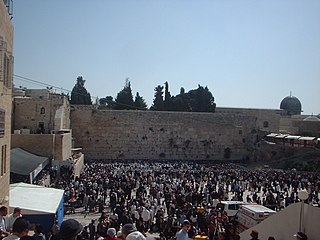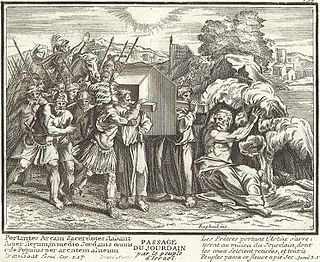
Yom Kippur is the holiest day of the year in Judaism. It occurs annually on the 10th of Tishrei, corresponding to a date in late September or early October.

Shema Yisrael is a Jewish prayer that serves as a centerpiece of the morning and evening Jewish prayer services. Its first verse encapsulates the monotheistic essence of Judaism: "Hear, O Israel: YHVH our God, YHVH is one", found in Deuteronomy 6:4.

Shavuot, or Shvues, is a Jewish holiday, one of the biblically ordained Three Pilgrimage Festivals. It occurs on the sixth day of the Hebrew month of Sivan; in the 21st century, it may fall anywhere between May 15 and June 14 on the Gregorian calendar.

Yom HaZikaron laShoah ve-laG'vurah, known colloquially in Israel and abroad as Yom HaShoah and in English as Holocaust Remembrance Day, or Holocaust Day, is observed as Israel's day of commemoration for the approximately six million Jews murdered in the Holocaust by Nazi Germany and its collaborators, and for the Jewish resistance in that period. In Israel, it is a national memorial day. The first official commemorations took place in 1951, and the observance of the day was anchored in a law passed by the Knesset in 1959. It is held on the 27th of Nisan, unless the 27th would be adjacent to the Jewish Sabbath, in which case the date is shifted by a day.

Havdalah is a Jewish religious ceremony that marks the symbolic end of Shabbat and ushers in the new week. The ritual involves lighting a special candle with several wicks, blessing a cup of wine, and smelling sweet spices. Shabbat ends on Saturday night after the appearance of three stars in the sky. Havdalah may be performed as late as sunset of the Tuesday following Shabbat. Havdalah is also recited at the conclusion of the biblical holidays.

Yom HaZikaron, in full Yom HaZikaron LeHalelei Ma'arkhot Yisrael ul'Nifge'ei Pe'ulot HaEivah, is Israel's official remembrance day, enacted into law in 1963. While Yom HaZikaron has been traditionally dedicated to fallen soldiers, commemoration has also been extended to civilian victims of terrorism.

The Hebrew language uses the Hebrew alphabet with optional vowel diacritics. The romanization of Hebrew is the use of the Latin alphabet to transliterate Hebrew words.

The Priestly Blessing or priestly benediction, also known in rabbinic literature as raising of the hands, rising to the platform, dukhenen, or duchening, is a Hebrew prayer recited by Kohanim. The text of the blessing is found in Numbers 6:23–27. It is also known as the Aaronic blessing.

Israeli Army Radio or Galei Tzahal, known in Israel by its acronym Galatz, is a nationwide state funded Israeli radio network operated by the Israel Defense Forces. The station broadcasts news, music, traffic reports and educational programs to the general public as well as entertainment and military news magazines for soldiers. The network has one main station and an offshoot - Galgalatz - that broadcasts music and traffic reports 24 hours a day in Hebrew. The staff includes both soldiers and civilians. Until December 2013, it broadcast via shortwave to Europe. There is still a livestream feed on the internet. Following the outbreak of the Israel–Hamas war in 2023, it started using the former frequencies of 1287 kHz and 945 kHz to reach bomb shelters and other areas in Israel.
Kedushah is the name of several prayers recited during Jewish prayer. They have in common the recitation of two Biblical verses, Isaiah 6:3 and Ezekiel 3:12. These verses come from prophetic visions in which angels sing praises to God.

Channel 1 was the second oldest television channel in Israel and one of five terrestrial channels in the country.
Nishmat is a Jewish prayer that is recited during Pesukei D'Zimrah between the Song of the Sea and Yishtabach on Shabbat and Yom Tov. It is also recited during the Passover seder.

Kfar Uria is a moshav in central Israel. Located near Beit Shemesh in the Shephelah. It falls under the jurisdiction of Mateh Yehuda Regional Council. In 2022 it had a population of 910.
Shir Shel Yom, meaning "'song' [i.e. Psalm] of [the] day [of the week]" consists of one psalm recited daily at the end of the Jewish morning prayer services known as shacharit. Each day of the week possesses a distinct psalm that is referred to by its Hebrew name as the shir shel yom and each day's shir shel yom is a different paragraph of Psalms.

Tu BiShvat is a Jewish holiday occurring on the 15th day of the Hebrew month of Shevat. It is also called Rosh HaShanah La'Ilanot, literally "New Year of the Trees". In contemporary Israel, the day is celebrated as an ecological awareness day, and trees are planted in celebration.

Yom HaAliyah, or Aliyah Day, is an Israeli national holiday celebrated annually according to the Jewish calendar on the tenth of the Hebrew month of Nisan to commemorate the Jewish people entering the Land of Israel as written in the Hebrew Bible, which happened on the tenth of the Hebrew month of Nisan. The holiday was also established to acknowledge Aliyah, immigration of Jews to the Jewish state, as a core value of the State of Israel, and honor the ongoing contributions of Olim, Jewish immigrants, to Israeli society. Yom HaAliyah is also observed in Israeli schools on the seventh of the Hebrew month of Cheshvan.
Kan Educational is a public television channel in Israel designated for children, on behalf of the Israel Broadcasting Corporation. The channel launched on August 15, 2018 and replaced Israeli Educational Television, which preceded it. It now broadcasts existing IETV programs including older and newer programs, as well as providing new seasons to some of those programs, and also introduces new series along the way. All of its content will be bought from third parties, unlike IETV who produced many of their shows in-house.

Tzvi Ayalon was a Haganah leader and a major general (Aluf) in the Israel Defense Forces, he served as the first Deputy Chief of General Staff as well as the commander of the Central Command (Israel). After his military service he served as the deputy director-general of the Ministry of Defense (Israel) and Ambassador of Israel in Romania.













